Energy Powers Democratic Wins
Air Date: Week of November 14, 2025

New York City’s Mayor-elect Zohran Mamdani (D) frames the climate and affordability crises as intimately connected. (Photo: Bryan Berlin, Wikimedia Commons, CC BY-SA 4.0)
November’s elections brought victories across the country for state and local Democratic candidates who pledged to address rising energy costs. Marianne Lavelle, Washington bureau chief for our media partner, Inside Climate News, joins Hosts Aynsley O’Neill and Paloma Beltran to talk about the challenges of meeting those promises the new Governors-elect of Virginia and New Jersey, and the newly elected Mayor of New York, will likely face.
Transcript
BELTRAN: From PRX and the Jennifer and Ted Stanley studios at the University of Massachusetts Boston, this is Living on Earth. I’m Paloma Beltran.
O’NEILL: And I’m Aynsley O’Neill.
Paloma, I don’t need to tell you that there has been a lot of legislative and funding chaos in Washington DC recently, to put it mildly, and Democrats are struggling to retain some grip on political power during the Trump presidency and with Republicans at the reins in Congress.
BELTRAN: That’s right, Aynsley, and with all that division and infighting in Washington sucking up much of the political air, it can be easy to forget about the impact of local politics. But of course, what happens at the local and state level can make a huge difference, especially in the long run and when it comes to environmental issues.

Governor-elect Abigail Spanberger (D) of Virginia, along with the state’s Democratic-led House of Delegates, will face tough decisions around proposals for data center expansion across the state. (Photo: U.S. House of Representatives, Wikimedia Commons, Public domain)
O’NEILL: Well November’s elections did bring notable victories and a sigh of relief for Democrats across the country, boosting the party’s optimism and generating questions about its future direction.
BELTRAN: Now environmentalists are wondering to what extent addressing the climate crisis will be part of that future.
O’NEILL: Here to talk to us about what to keep an eye on as these new leaders step into action is Marianne Lavelle, Washington bureau chief for our media partner, Inside Climate News. Welcome back to Living on Earth, Marianne!
LAVELLE: Great to be here.
O'NEILL: So perhaps the result that got the most attention was the victory of 34-year-old Democratic Socialist Zohran Mamdani as the next mayor of New York City.
BELTRAN: Yeah, his campaign, which focused a lot on affordability for average New Yorkers, seemed to strike a positive chord, especially with young progressives.
O'NEILL: But something that may or may not have gotten a little lost in the shuffle were his stances on climate issues. Marianne, how has Mamdani framed the climate crisis?
LAVELLE: Yes, I think it may have gotten lost because he didn't talk about it directly, but in the context of this greater affordability message, he would say when asked about it, climate and quality of life are not two separate concerns. They're one and the same. And I think the best example of how he framed the issue is he had this “Green Schools for a Healthier New York City” proposal. He wants a massive program of upgrading 500 schools. And this is a very popular idea, because everyone knows that those schools really need upgrades. And if they can upgrade the school buildings while improving energy systems and even adding solar and replace asphalt with green school yards, it could reduce costs as well as improving the schools, which is something that's long been needed. So it's kind of the win-win solution on climate and quality of life that he liked to talk about.

New Jersey’s Governor-elect Mikie Sherrill (D) has promised a utility rate freeze on her first day in office. (Photo: Joeshmonobody, Wikimedia Commons, CC BY-SA 4.0)
O'NEILL: And so now he's got a four-year term coming up. What will be the biggest challenges for a New York City mayor to deal with when it comes to climate?
LAVELLE: There's no question that it's going to be all of those big buildings in New York City. The city actually in 2019, passed a law, one of the world's most ambitious city laws to reduce greenhouse gas emissions, and 70% of those emissions come from big buildings. The landowners say this is going to be way too expensive for us. We're going to have to invest millions of dollars in these upgrades, and the current mayor, Eric Adams, had been working to ease the requirements for the real estate industry. What Mamdani has said is he's going to enforce the law, but he's going to find ways to make it affordable, to help the landlords pay for those upgrades. So he's going to use some existing programs to really give them, kind of a one stop shop for help on doing this. Tax breaks certainly could be a big part of that. That is an area where he's going to have this tension between affordability and climate goals.
BELTRAN: So where else might he encounter some tension between this push for affordability and development?
LAVELLE: Well, the natural gas industry is going to be wanting to build more pipelines and plants in New York and they argue that this is to make energy affordable and reliable. And right now, there's a big pipeline project that the governor approved just this week, and it's going to continue to be a big issue for New York City because it goes right by Staten Island and Rockaway Peninsula. The mayor is certainly going to be pulled into the debate over that infrastructure, and he says he doesn't want to see more natural gas infrastructure. The industry, meanwhile, will be saying, well, we're the industry that's going to make energy affordable.

Peter Hubbard (D) was one of the Democrats elected to the Georgia Public Service Commission. It was the first time Democrats were elected to a state office since 2006. (Photo: TwiceBakedBean, Wikimedia Commons, CC BY-SA 4.0)
BELTRAN: Sounds like he has his work cut out for him.
LAVELLE: He really does, and he's going to be watched closely, because other cities around the country and really around the world, they want to see if they can set similar goals on climate and really make them happen.
O'NEILL: Well, there were a number of elections in other states and municipalities, and so what other leaders who were elected should we be paying attention to, Marianne?
LAVELLE: Well, I definitely have an eye on Abigail Spanberger. She's the former Democratic member of Congress from Virginia who was just elected Virginia's new governor.
BELTRAN: And from what I understand, she will be the first female governor of the state, right?
LAVELLE: That's right. And Democrats also flipped 13 seats in their legislature, giving them a really solid majority in the state's House of Delegates.
BELTRAN: Wow. Well, what does this new balance of power mean for environmental policies in the state?
LAVELLE: For both Governor Spanberger and the legislature, there's going to be urgent, tough issues on a massive amount of new data center proposals, these big data centers that are necessary for artificial intelligence. Right now, Virginia is the number one state in data center capacity. Northern Virginia is actually the number one market in the world. Only Beijing is second for these big data centers. And there are proposals out there to add four times the current capacity.
O'NEILL: And now Marianne remind us why these data centers are a cause for so much environmental concern?
LAVELLE: Well, there's a lot of questions, including the footprint of the centers and also their water use, but probably the biggest questions have to do with their huge energy use. In 2020 Virginia's Clean Economy Act was passed, and that was meant to decarbonize the state's electric grid by 2050 but how can the state reduce its fossil energy as the law calls for when it's seeing all this new demand from the data centers?
O'NEILL: Well, I know Spanberger's platform included talk about lowering energy costs and producing more energy in Virginia. How did she propose to do that?
LAVELLE: She'd like to see a big build out of solar and battery storage in Virginia, and she's also a big proponent of offshore wind, but all of the offshore wind projects require federal approvals, and she's going to face opposition from the Trump administration on that. There could be a similar situation like we've seen in New York, where the President pressures the governor to get concessions and agree to natural gas build out in return for his approval of wind projects. So that's definitely a thing to watch for.
O'NEILL: All right, well, Marianne, as many of our listeners know, I am a proud Jersey girl, and we just elected a new governor, Democrat Mikie Sherrill. What promises has she made along the lines of energy?
LAVELLE: Well, she promises to put a freeze on utility rates on her first day in office, and then begin a massive build out of new electricity sources. New Jersey has had one of the highest run ups in electricity bills in the country, up about 20% in one year, and she said, we need more power, and we need to know more about how the utility companies are using this money.
BELTRAN: And to what extent is Governor-elect Sherrill proposing renewable energy expansion?
LAVELLE: She definitely wants to see solar and battery power to be a big emphasis. She also is a proponent of offshore wind. Her opponent was going to put a ban on offshore wind. So that's a big difference that New Jersey voters voted for. There still is going to be pressure to expand natural gas, just as in the other states. New Jersey has a lot of nuclear power, and she wants to build on that, and she said that also is a way to expand energy and keep carbon emissions down.

Marianne Lavelle is the Washington Bureau Chief for our media partner, Inside Climate News. (Photo: Courtesy of Marianne Lavelle)
BELTRAN: Yeah, and Marianne, I also heard that the Georgia Public Service Commission election was somewhat of a shock, with Democrats Peter Hubbard and Alicia Johnson securing two seats on the Commission. What was going on there, do you think?
LAVELLE: Absolutely, it was a big deal. And the Georgia Public Service Commission, not many people usually keep track of that office, but it's a big office for deciding utility rates, and people were pretty fed up with a whole bunch of increases in their electricity bills. So the same issue that we've seen in New Jersey, in Virginia, in New York: energy affordability.
O'NEILL: Yeah, that really seems to be sort of a common theme out there, Marianne. What else have you seen across these various different political landscapes when it comes to climate?
LAVELLE: Well, one thing that I think you're going to hear throughout the coming year is tying these rising energy and electricity rates to the Trump administration policies. We've had electricity rates increasing even before Trump took office, but things like shutting down offshore wind, forcing old coal plants to run even though they're problematic. You're going to hear opponents of the Republicans be bringing this up over and over again, that clean energy is cheaper energy, and that is really going to be a theme in these political races in the coming years that could help decide control of Congress.
O'NEILL: We will definitely have to keep tabs on these new leaders and new policies on the road to midterms just one year away.
LAVELLE: Absolutely.
BELTRAN: Marianne Lavelle is the Washington bureau chief for our media partner Inside Climate News. Thanks so much for taking the time with us, Marianne.
O'NEILL: Thank you, Marianne.
LAVELLE: Thanks for having me.
Links
Inside Climate News | “Green Groups’ Election Takeaway: Focus on Trump Energy Agenda Costs”
Living on Earth wants to hear from you!
Living on Earth
62 Calef Highway, Suite 212
Lee, NH 03861
Telephone: 617-287-4121
E-mail: comments@loe.org
Newsletter [Click here]
Donate to Living on Earth!
Living on Earth is an independent media program and relies entirely on contributions from listeners and institutions supporting public service. Please donate now to preserve an independent environmental voice.
NewsletterLiving on Earth offers a weekly delivery of the show's rundown to your mailbox. Sign up for our newsletter today!
 Sailors For The Sea: Be the change you want to sea.
Sailors For The Sea: Be the change you want to sea.
 The Grantham Foundation for the Protection of the Environment: Committed to protecting and improving the health of the global environment.
The Grantham Foundation for the Protection of the Environment: Committed to protecting and improving the health of the global environment.
 Contribute to Living on Earth and receive, as our gift to you, an archival print of one of Mark Seth Lender's extraordinary wildlife photographs. Follow the link to see Mark's current collection of photographs.
Contribute to Living on Earth and receive, as our gift to you, an archival print of one of Mark Seth Lender's extraordinary wildlife photographs. Follow the link to see Mark's current collection of photographs.
 Buy a signed copy of Mark Seth Lender's book Smeagull the Seagull & support Living on Earth
Buy a signed copy of Mark Seth Lender's book Smeagull the Seagull & support Living on Earth

